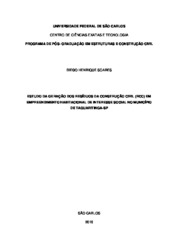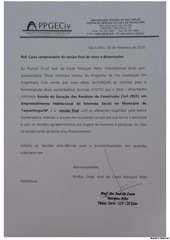Mostrar el registro sencillo del ítem
Estudo da geração dos resíduos da construção civil (RCC) em empreendimento habitacional de interesse social no município de Taquaritinga-SP
| dc.contributor.author | Soares, Diego Henrique | |
| dc.date.accessioned | 2020-02-04T18:31:33Z | |
| dc.date.available | 2020-02-04T18:31:33Z | |
| dc.date.issued | 2015-08-20 | |
| dc.identifier.citation | SOARES, Diego Henrique. Estudo da geração dos resíduos da construção civil (RCC) em empreendimento habitacional de interesse social no município de Taquaritinga-SP. 2015. Dissertação (Mestrado em Engenharia Civil) – Universidade Federal de São Carlos, São Carlos, 2015. Disponível em: https://repositorio.ufscar.br/handle/ufscar/12219. | * |
| dc.identifier.uri | https://repositorio.ufscar.br/handle/ufscar/12219 | |
| dc.description.abstract | The construction industry is the largest consumer of natural resources in their activities. It is estimated that a square meter of construction of a building is consumed an average of one ton of materials, which explains the use of large amounts of cement, sand, gravel, and other inputs during its construction process. Furthermore, the construction is the industry which produces more waste. In Brazil, this situation is aggravated by the construction technology normally applied in new buildings, especially in works of social interest. In these projects, the traditional process of implementation combined with poor quality of production management favors large losses and physical resources waste, which ultimately generate huge amounts of construction waste (RCC) in the beds. For all these reasons, the diagnosis of RCC generation in housing projects of social interest is of great importance, since it can support management strategies of material consumption to reduce waste and costs. In this sense, this paper aims to study the generation of waste from the construction of a housing project of social interest in the city of Taquaritinga-SP, with special focus on the generation rate (kg / m²) of this type of venture. The methodology will be held bibliographical and documentary reviews of the object of study work, and methodologies used by other authors in previous studies to obtain the generation of RCC and their respective generation rate per square meter. It should be noted that in developed countries, this waste production indicator from new construction is around 50 kg / m2, well below the Brazilian indices that revolve around 150 kg / m2. This study showed the rate of 226,28kg / m², demonstrating that the enterprise is slightly above the Brazilian indices. With the completion of this research, we hope to obtain important results for the area of social housing, as the studies of RCC does not include rates for this type of residential development, unlike the indexes extracted in vertical buildings or even reform and demolitions. | eng |
| dc.description.sponsorship | Não recebi financiamento | por |
| dc.language.iso | por | por |
| dc.publisher | Universidade Federal de São Carlos | por |
| dc.rights | CC0 1.0 Universal | * |
| dc.rights.uri | http://creativecommons.org/publicdomain/zero/1.0/ | * |
| dc.subject | Construção civil | por |
| dc.subject | Resíduos da construção civil | por |
| dc.subject | Habitações de interesse social | por |
| dc.subject | Resíduos sólidos | por |
| dc.subject | Construction | eng |
| dc.subject | Waste construction | eng |
| dc.subject | Social housing | eng |
| dc.title | Estudo da geração dos resíduos da construção civil (RCC) em empreendimento habitacional de interesse social no município de Taquaritinga-SP | por |
| dc.title.alternative | Study on the generation of civil construction waste (RCC) in a housing enterprise of social interest in the municipality of Taquaritinga-SP | eng |
| dc.type | Dissertação | por |
| dc.contributor.advisor1 | Marques Neto, José da Costa | |
| dc.contributor.advisor1Lattes | http://lattes.cnpq.br/2392932422695163 | por |
| dc.description.resumo | A construção civil é a indústria que mais consome recursos naturais em suas atividades. No Brasil, este quadro é agravado pela tecnologia construtiva, normalmente aplicada em construções novas, principalmente quando envolve obras de interesse social. Nestes empreendimentos, o processo tradicional de execução, aliado à baixa qualidade do gerenciamento da produção, favorece grandes perdas e desperdícios de recursos físicos, o que acaba por gerar enormes quantidades de resíduos da construção civil (RCC) nos canteiros. Por todas estas razões, o diagnóstico da geração de RCC em empreendimentos habitacionais de interesse social torna-se um importante instrumento, uma vez que pode subsidiar estratégias de gestão do consumo de materiais para redução de desperdícios e custos. Neste sentido, o presente trabalho tem como objetivo estudar a geração dos resíduos da construção civil de uma obra habitacional de interesse social, na cidade de Taquaritinga-SP, com especial foco na taxa de geração (kg/m²) deste tipo de empreendimento. Como metodologia, realizaram-se revisões bibliográficas e documentais da obra objeto de estudo, e metodologias usadas por outros autores, em estudos anteriores, para a obtenção da geração de RCC e sua respectiva taxa de geração por metro quadrado. Cabe observar que, em países desenvolvidos, esse indicador de produção de resíduos provenientes de construções novas gira em torno de 50 kg/m2, muito abaixo dos índices brasileiros, que giram em torno de 150 kg/m2.Com a realização da presente pesquisa, encontrou-se a taxa de 226,28 kg/m², o que apresenta uma taxa dentro dos índices encontrados por diversos autores, especialmente Monteiro (2001). | por |
| dc.publisher.initials | UFSCar | por |
| dc.publisher.program | Programa de Pós-Graduação em Engenharia Civil - PPGECiv | por |
| dc.subject.cnpq | ENGENHARIAS::ENGENHARIA CIVIL::CONSTRUCAO CIVIL | por |
| dc.publisher.address | Câmpus São Carlos | por |
| dc.contributor.authorlattes | http://lattes.cnpq.br/4578449335009496 | por |


